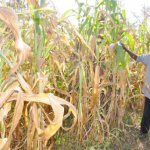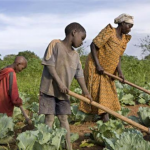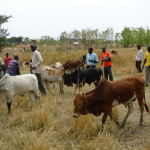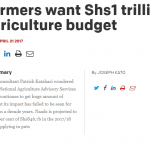CSBAG Intervention: Agriculture Sector
We underscore the vital significance of agriculture to the effectiveness of the Ugandan society. Vision 2040 indicates that the sector has the potential to transform the country to middle income status within 30 years. The sectors significance can be observed through the effect it has on Ugandas growth, specifically contributing 25% of Ugandas GDP, 40% of its export revenue, social development and poverty reduction to a tune of 70% over the period 2006 13. However, over the last five years, statistics show that output in agriculture has been growing at an average of 2.6% per annum, compared to the ideal 6% annual growth by the Comprehensive Africa Agriculture Development Programme (CAADP). Therefore, it is of vital importance to double our efforts and come up with better strategies to improve the growth of this sector.
The agriculture sector in Uganda is managed by a number of government institutions including; Ministry of Agriculture, Animal Industries and Fisheries (MAAIF), the National Agriculture Research Organization (NARO), National Agriculture Advisory Services (NAADS), Dairy Development Authority (DDA), Cotton Development Organization (CDO), National Animal Genetic Resource Centre & Data Bank (NAGRC&DB), Coffee Development Authority (CDA), Kampala Capital City Authority (KCCA) and the respective Local Governments (LG).
The strategies GoU has proposed to transform the agriculture sector from subsistence farming to commercial agriculture include; i) to increase production and productivity of agricultural commodities and enterprises; ii) to increase access to critical farm inputs; iii) to improve access to markets and value addition and strengthen the quality of agricultural commodities, and; iv) to strengthen the agricultural services institutions and the enabling environment.
How CSBAG Works with the Agriculture Sector
CSBAG interfaces with the Agriculture sector through the Sector Working Group (SWG) modality where two CSO representatives i.e. UNFFE and ACSA are the conveyors of key sector policy asks on the sector policy.
Unilaterally, CSBAG is often consulted by the MAAIF and other stakeholders (including development partners) when developing sector policy. In the 2018 we took lead in the CSO consultations for the development of the Agriculture Financing Policy and the Seed Policy in 2016.
Annually, the Sector organizes and holds the Joint Sector Review engagements and CSBAG is called upon to provide and present independent reviews of the sectors performance as was done in for the FY 2017/18, 2016/17 and 2015/16. Non-State Actor Statement: Civil Society Perspective on Agriculture Sector Performance During FY 2015/16;
When the sector budget is drawn and submitted for review in January and March every FY, CSBAG provides independent reviews of the budgets and this review is used in Committees of Parliament. See link
To do all the work CSBAG does with the sector, there are several partners that we work with and these include;

CSO position papers
Media



















